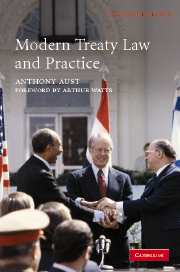Book contents
- Frontmatter
- Contents
- Foreword to the first edition by Sir Arthur Watts
- Preface to the second edition
- Articles of the Convention cited in the text
- Table of treaties
- Table of MOUs
- Table of cases
- Glossary of legal terms
- List of abbreviations
- Introduction
- 1 Vienna Convention on the Law of Treaties 1969
- 2 What is a treaty?
- 3 MOUs
- 4 Capacity to conclude treaties
- 5 Full powers
- 6 Adoption and authentication
- 7 Consent to be bound
- 8 Reservations
- 9 Entry into force
- 10 Treaties and domestic law
- 11 Territorial application
- 12 Successive treaties
- 13 Interpretation
- 14 Third states
- 15 Amendment
- 16 Duration and termination
- 17 Invalidity
- 18 The depositary
- 19 Registration and publication
- 20 Dispute settlement and remedies
- 21 Succession to treaties
- 22 International Organisations
- 23 Drafting and final clauses
- Appendices
- Index
17 - Invalidity
- Frontmatter
- Contents
- Foreword to the first edition by Sir Arthur Watts
- Preface to the second edition
- Articles of the Convention cited in the text
- Table of treaties
- Table of MOUs
- Table of cases
- Glossary of legal terms
- List of abbreviations
- Introduction
- 1 Vienna Convention on the Law of Treaties 1969
- 2 What is a treaty?
- 3 MOUs
- 4 Capacity to conclude treaties
- 5 Full powers
- 6 Adoption and authentication
- 7 Consent to be bound
- 8 Reservations
- 9 Entry into force
- 10 Treaties and domestic law
- 11 Territorial application
- 12 Successive treaties
- 13 Interpretation
- 14 Third states
- 15 Amendment
- 16 Duration and termination
- 17 Invalidity
- 18 The depositary
- 19 Registration and publication
- 20 Dispute settlement and remedies
- 21 Succession to treaties
- 22 International Organisations
- 23 Drafting and final clauses
- Appendices
- Index
Summary
Groucho: That's what they call a sanity clause. Chico: You can't fool me; there ain't no Sanity Claus.
McNair devoted thirty-one pages to invalidity, even though he found little diplomatic or judicial (though abundant literary) authority, on, for example, duress. The Convention therefore devotes nine main articles on invalidity (Articles 46–53 and 64), even though the subject is not important for the day-to-day work of a foreign ministry. During more than thirty-five years of practice, the author can recall only one suggestion that an existing treaty might be invalid. The International Law Commission was well aware that invalidity was a rarity, there being a natural presumption that a treaty is valid; its continuance in force being the normal state of things. Nevertheless, because of its intellectual attraction, learned works continue to devote much space to the topic. What follows is therefore a short account, in which we can also step back in time.
Violation of internal law on competence to conclude treaties
Article 46 is the only provision on invalidity which may have some practical importance. The overriding need for certainty in treaty relations is clearly reflected in its wording:
(1) A State may not invoke the fact that its consent to be bound by a treaty has been expressed in violation of a provision of its internal law regarding competence to conclude treaties as invalidating its consent unless that violation was manifest and concerned a rule of its internal law of fundamental importance.
- Type
- Chapter
- Information
- Modern Treaty Law and Practice , pp. 312 - 323Publisher: Cambridge University PressPrint publication year: 2007



